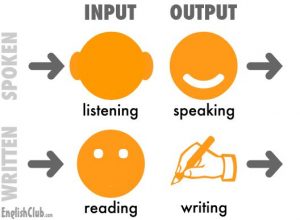Overview of language learning process
After going through the process of learning a language, at least once to mastery, I do believe that I have acquired some experience and knowledge worth sharing. So with this opportunity, I have decided to write a series of blogs to materialize my thoughts and experience on the subject. I hope that these blogs can be somewhat of use to the average person who is struggling with learning a language.
This first blog will be my overall view of the language learning process and a little break down of each level of language proficiency and their respective obstacles.
The traditional thinking is the process of learning a language should follow a certain sequence which bases off of the 4 fundamental skills in an order of increasing difficulty: listening, speaking, reading then writing (nghe noi doc viet). You should start by honing your listening and speaking skills to a certain degree after moving on the more challenging skills, reading and writing. And the reasoning here is that reading and writing are so immensely difficult compared to the former two. So in order to achieve mastery when it comes to reading and writing, one will need to sacrifice an extended period of time to develop, even for the ones who have already mastered other skills. And that is why most of the writing mentioned in this blog refers to basic writing, preferably writing in order to summarize what you have read or listened to. Furthermore, critical writing is an ability which is beyond merely utilizing a language but it is a congregation of various sets of skills and none of which I have the confidence to discuss at the moment.
From my own experience, the order in which one should learn a language is listening with concurrent reading, then writing and speaking. These 4 fundamental language skills, though they are interconnected, can and should be divided into two groups: absorption of information or memorization (listening/reading) and practiced recitation of the previously acquired information, remembering (speaking/writing). The memorization part should be the main focus as it is the only means to achieve the meat and bone of any language, knowledge itself. On the other hand, speaking and writing should be secondary since their roles are simply to recite and reinforce what you already know. You can’t summon what you don’t have.
By focusing on a certain skill, we are not talking about devoting your time solely to that one skill. In fact, the ideal situation is to study all facets of a language all at once, but space your learning out and partition your time accordingly. Maybe 80% of your time to listening/reading and 20% to speaking/writing. And the rationality here is that the intermittent speaking/writing sessions will help you to fortify what is already there by recalling the material periodically, preferably with increasing time intervals (spaced repetition).
And to dive in a little deeper, we can further break down any skill into three main levels: beginner, intermediate, advanced.
With listening/reading, level one is the elementary understanding of basic spoken word and simple text.
Next is the intermediate level where you can understand reasonably well. However, this is the one where you tend to make the most mistakes since you can’t completely follow a listening session or grasp all the details in a reading text. Thus resulting in a very superficial understanding of the language. In this stage, your brain often tricks itself into thinking that you know what it is all about. A slippery slope that would lead you to having a false sense of knowing, an unreliable base to work off of. And this is due to the fact that your brain is extremely efficient at filling in missing information as well as flushing out nonsensical ones. This bias is more prevalent in listening rather than reading since all the information is not as readily accessible once they’d been delivered. On the contrary, in the case of reading, though you do not have problems with missing information, the problems with nonsensical ones remain. On top of that, simply reading texts means you are missing out on what might be the most important aspect, the ability to see and feel how the language is being produced. Mouth movements, hand gestures, body language, visual examples, any good speaker should utilize all of these resources to effectively convey their ideas. Even a mediocre speaker will unconsciously give out visual cues that you can pick up on. Nonetheless, these are not available for reading. Hence making reading one of the most difficult skills to acquire.
The last main one is advanced level. This is the level in which you have a complete command of the language but sometimes have problems in unfamiliar situations or vocabulary.
As for speaking/writing, beginner level starts with the ability to produce/recall short sentences with basic grammars.
Next is intermediate level. This is the one in which you have the ability to convey your ideas in an semi-natural manner with inconsequential mistakes. This is the stage where your 4 language skills divert the most. Unlike listening/reading where you don’t need to understand every little detail but the whole meaning, in speaking/writing, you need to mean every word you say/write. And so very often at this stage, you will find yourself asking the same type of question of “what is the difference between scope and scale”. You develop this need to differentiate between similar terminologies in order to use them correctly.
Lastly, advanced level is one in which you can deliver your thoughts in a concise, native-like fashion without little to none syntaxical mistakes.
It entirely depends on your purpose of learning a language, that the importance of each level shift. If you consider a language as a simple tool for communication, there is no need to aim for perfection, especially speaking and writing wise. On the contrary, if excellence is the end goal then dedicate your time and energy on reading and writing is a must.
References:
https://www.spaceotechnologies.com/make-language-learning-app-features/



